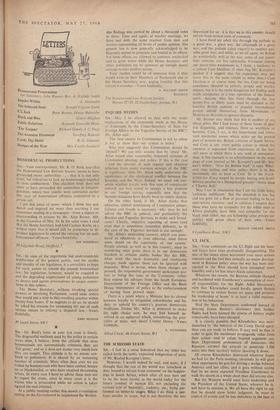THE SCHIZOID STATE
SIR,—I feel in a sense honoured that my letter has called forth the nobly expressed indignation of parts of Mr. Rashid Karapiet's letter.
However, I would indeed be nail, and more, if I thought that the rest of the world was 'somehow in duty bound to refrain from comment' on the happen- ings in South Africa, which after all may turn out to be the most fateful in the world today for the future conduct of human life, not excluding the various acts of Summitry. rocketry. etc., being per- formed on better-lit stages. What I do think is per- haps smaller in scope, but is not therefore the less important for us: it is that we in this country should refrain from certain sorts of comment.
I have lived my adult life through the prelude to a great war, a great war, the aftermath of a great war, and the prelude (absit omen!) to another pos- sible great war; and while, as we all agree, we British do wonderfully well in the war, some of our peace- time attitudes are less admirable. Foremost among our peace-time weaknesses is, I think, a tendency to a certain Cant Idealism. (I must beg Mr. Karapiet's pardon if I suggest that his experience may not cover this to the same extent as mine does.) Cant Idealism is of course none the less Cant for being sometimes directed to entirely proper and worthy objects, but it is the more dangerous for finding such ready acceptance as a true operation of the human spirit. Anyone who has lived through the last twenty-five or thirty years must be alarmed as the familiar British patterns of popular international protest unfold themselves, from Movements to Motions to Marches to general disasters.
Mr. Seymer may think that this is another of my
cheap gibes. But 1 find many of these forms of pro- test disgusting, and estimate them as worthless or harmful. Cant, I say, is the impertinent and irrele- vant emotional noises which make up the greater part of present-day British criticism of South Africa; and Cant is any overt public action in which the emotion is separated from experience of the fact, still more in which there is any taint of oneupman- ship. A line example is an advertisement on the same page of your journal as Mr. Karapiet's and Mr. Sey- mer's letters : 'Now let - Britain lead: it says. What- ever true feeling and wise policy there is in this movement, this at least is Cant, So is the frisch- frithlicher Krieg waged by people buying non-South African peaches in a Hampstead grocery--worse than a 'Charity Ball.'
May I say in conclusion that I am far from being 'callously indifferent.' But the situation is too big and too grim for a flow of personal feeling to be an appropriate reaction : and in addition I suspect that those who have no sympathy for the white man in Africa probably have little real sympathy for the black man either, but are following some private (or public) wild goose chase of their own.—Yours faithfully.
8 Lyndhurst Road, NW3 RONALD VINCENT SMITH






































 Previous page
Previous page